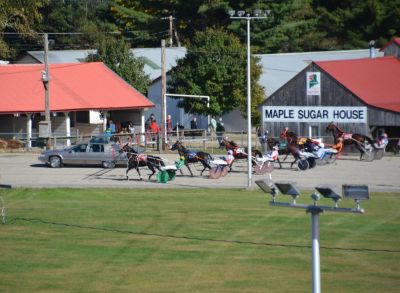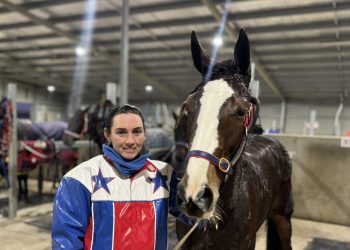 CUMBERLAND, MAINE — Harness racing horse owners can look forward to greener pastures, thanks to a new, local initiative and plans to expand racing permanently into Southern Maine.
CUMBERLAND, MAINE — Harness racing horse owners can look forward to greener pastures, thanks to a new, local initiative and plans to expand racing permanently into Southern Maine.
Michael Cinchett, who grew up in Cumberland, said he has been thinking about starting a harness racing company for years. Inspired by his late great-uncle’s love of the sport, he plans to begin racing at Cumberland Fairgrounds in May, with a racing schedule running through June, July, November and December.
Cinchett has leased the grounds and worked out a 56-day racing schedule this year with the state racing commission and only needs to get approval from the town council. Town Manager Bill Shane said the issue is likely to come before the council this month, or early April at the latest.
According to the Cumberland County Fair website, the harness racing program at the fairgrounds has been ongoing since 1868.
Cinchett said he accelerated his plans once Scarborough Downs ended its last season in November 2020. Henry Jennings, the state commission’s executive director, said Scarborough’s closure was not a surprise — the industry knew it would be happening for “quite some time,” but that didn’t make it any easier for racers to swallow.
Without that track, Jennings said, opportunities for racers to compete were lost. That matters, he said, because it’s expensive to own, train and stable a racehorse.
Randy Bickmore, who lives in Scarborough and stables 14 horses in Newfield, welcomed Cinchett’s new initiative.
“It sounds great,” he said. “It’s pretty exciting.”
Bickmore said racing at Scarborough Downs was once an ideal situation for him. Ever since the track closed its horse barns in 2016, however, he said he and other racers began questioning the stability of the business. Eventually, he said, he and others began driving to Plainridge Park Casino in Plainville, Massachusetts, lured by a steady venue and higher purses.
Now, Bickmore said, Cinchett’s company is giving him confidence in Maine-based racing again.
“I definitely will race in Maine more than I have in the past few years,” he said.
The Cumberland Farmers Club owns the fairgrounds, and its interim president, Lyle Merrifield, said early conversations with Cinchett began about two years ago. In light of the pandemic, which forced the club to cancel last year’s Cumberland Fair, Merrifield said starting regular racing on the grounds made sense.
“It appeared to be a good financial move for our farmers club.” he said.
Merrifield said Cinchett has leased the fairgrounds’ grandstands, horse barn and racetrack, but Merrifield declined to disclose for how much. Merrifield said other groups lease parts of the fairgrounds throughout the year, but this move, encompassing nearly one-third of the property, is the largest single lease he can recall.
He said it took a lot to negotiate, including getting permission from the racing commission, making sure the agreement wouldn’t clash with other leases, and ensuring there were enough race days on the calendar.
“There were a lot of variables that had to come together to make it work,” Merrifield said.
The track at Cumberland Fairgrounds lit up at night in this undated photo. Courtesy / Stephen D. Thompson
Cinchett said his racing company, First Tracks Investments, is a subsidiary of his family business, ELC Inc. The parent company, founded in 1981, owns a number of recognizable properties, ranging from the Portland Regency Hotel in Portland to Casco Bay Ford in Yarmouth to Pine Ridge Acres farm in Cumberland.
Cinchett said he plans to offer racing on a similar size and scope to what visitors see every year at the Cumberland Fair and other agricultural fairs statewide.
He said he deliberately set up his racing calendar so as not to conflict with other fair racing days, or with the schedule set by Hollywood Casino Raceway in Bangor, the only other commercial raceway in the state.
“None of the horsemen have to choose which track they go to on any given day,” he said.
Race days are defined as how many days in a single year competitions are held in the state. Jennings said about five years ago, there were as many as 200 in a calendar year. In 2019, there were only about 170, and this year, he said, the commission is hoping to see about 150.
Even that, he said, is optimistic, given that 53 of those days are scheduled during the state’s eight agricultural fairs, which could be canceled again by the pandemic this year.
So Jennings said the state welcomed Cinchett’s new initiative, which accounts for 56 of those 150 days.
“It’s huge to have the presence in southern Maine, and it’s huge to have that critical mass,” he said.
Cinchett said he’s not just thinking locally. He has partnered with Black Bear Racing LLC, a company that does similar harness racing business in California under the name Golden Bear Racing, to help set up TV simulcasting.
“The harness industry, we think it can be strong and viable and do great things for the state of Maine,” he said.
Reprinted with permission from THE FORECASTER

 USA
USA Canada
Canada Australia
Australia New Zealand
New Zealand Europe
Europe UK / IRE
UK / IRE




